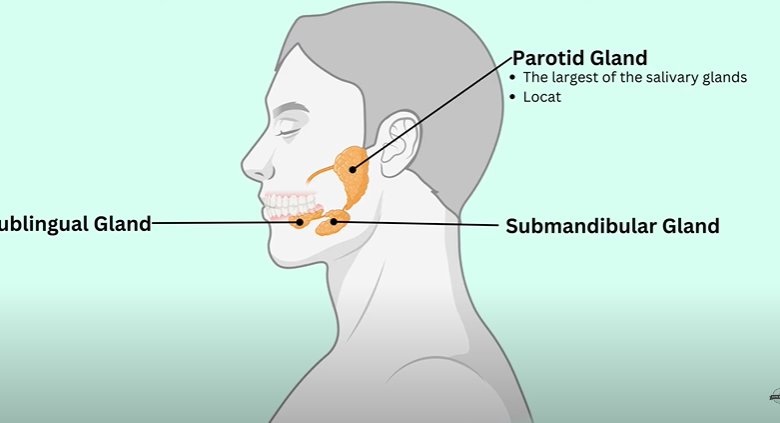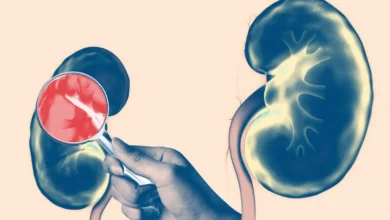
Saliva initiates the breakdown of starch in food through its enzyme, amylase. It also moistens food, aiding in swallowing and the preparation for digestion.
Understanding the role of saliva is crucial to appreciating the comprehensive process of digestion. Saliva, a liquid secreted by the salivary glands in the mouth, serves multiple purposes in the human digestive system. Its presence is not merely for alleviating dry mouth but plays a pivotal role right from the moment we take our first bite.
In saliva, primarily amylase, enzymes jumpstart the digestion of complex carbohydrates, breaking them down into simpler sugars. This enzymatic action makes the subsequent process of nutrient absorption more efficient. Beyond its enzymatic action, saliva also acts as a lubricant, ensuring that the masticated food, or bolus, can be easily swallowed. The digestive journey beginning in the mouth sets the stage for optimal nutrient breakdown and absorption further down the gastrointestinal tract.
Contents
- 1 The Essence Of Saliva
- 2 Initiating Digestion: Saliva’s First Touch
- 3 Beyond Digestion: Other Salivary Functions
- 4 Saliva’s Role In Taste And Swallowing
- 5 Saliva As A Gatekeeper
- 6 Hydration And Saliva
- 7 Diagnostic Potential Of Saliva
- 8 Enhancing Salivary Function
- 9 Final Thoughts: Saliva’s Multifaceted Role
- 10 Conclusion
The Essence Of Saliva
Think of saliva as the unsung hero in food digestion. This clear, watery liquid might seem unimpressive, but it plays a colossal role in breaking down food and kickstarting the digestive process. Let’s unveil how saliva is the body’s natural digestion assistant.
Components Of Saliva
Saliva is much more than water. It’s a complex mix, teeming with essential substances that aid digestion. Here’s what you’ll find in saliva:
- Enzymes: They spearhead the breakdown of food. Amylase, a key enzyme, begins the digestion of carbohydrates.
- Water: Its 99% water content helps dissolve food so our taste buds can savour the flavours.
- Mucous: This slippery substance helps food slide down the throat smoothly.
- Electrolytes: Minerals like potassium and sodium maintain pH balance and tooth health.
- Proteins: They protect tooth enamel and prevent tooth decay.
- Antibodies: These fighters ward off bacteria, guarding against infections.
Production And Secretion
Saliva’s journey begins in the salivary glands. These glands are multitasking factories, producing up to two pints of saliva daily.
| Salivary Gland | Location | Role in Saliva Production |
| Parotid | Just in front of the ears | Produces a watery solution that contains enzymes |
| Submandibular | Below the jaw | Secretes a more viscous fluid for lubrication |
| Sublingual | Under the tongue | It emits a mucus-rich saliva |
Triggered by the sight, smell, or even the thought of food, saliva production ramps up. This prepares the mouth to commence digestion the moment food enters.
Initiating Digestion: Saliva’s First Touch
Digesting your favourite foods starts the moment they enter your mouth. Saliva plays a crucial role in kicking off the digestion process.
Saliva is more than just moisture. It’s a digestion dynamo. Your salivary glands work hard. They make about 0.5 to 1.5 litres of saliva each day! As you chew, saliva surrounds your food, prepping it for a smooth trip down your oesophagus. This is where digestion truly begins.
Breaking Down Starches
Here’s a surprise: digestion doesn’t only happen in your stomach. Your mouth gets a head start. Saliva acts right away on foods, particularly starches. Imagine your saliva unpacking your food like a suitcase, sorting your starchy carbs into simpler sugars even before you swallow.
The Enzymatic Action Of Amylase
Amylase is saliva’s secret weapon. This enzyme launches a sneak attack on starches the moment you start chewing. It breaks long starch molecules into smaller sugars. Think of amylase like tiny scissors, clipping the big starch chains into digestible pieces. It’s handy, making sure your body gets a head start in the digestion race.
Beyond Digestion: Other Salivary Functions
Saliva does much more than start the digestion process. This clear liquid serves several key roles that often go unnoticed but are vital for maintaining oral health and overall well-being. Let’s explore some of saliva’s critical functions beyond its digestive role.
Antibacterial Properties
Saliva is a defender against bacterial attacks in your mouth. It contains enzymes like lysozyme and lactoferrin. These enzymes attack bacteria. They break down their cell walls or deprive them of nutrients they need to grow. This means fewer dental infections and better oral hygiene.
- Lysozyme: Destroys bacteria by digesting their cell walls.
- Lactoferrin: Binds to iron, starving bacteria of essential nutrients.
- Immunoglobulins Bind to microbes, helping to remove them.
Tooth Enamel Protection
Enamel, the hard surface of your teeth, also benefits from saliva. Saliva is rich in calcium and phosphate. These minerals are the building blocks of enamel. When you eat, foods can erode your enamel. Saliva helps to redeposit those minerals back onto your teeth surfaces. This process is known as remineralization. It helps to keep enamel strong and resistant to decay.
| Mineral | Function |
| Calcium | Strengthens enamel by rebuilding its structure |
| Phosphate | Works with calcium to protect and restore enamel |
| Fluoride | Further fortifies enamel and reduces decay |
Saliva’s Role In Taste And Swallowing
Saliva plays a pivotal role in the sensory experience of tasting food and the subsequent swallowing process. It’s both fascinating and essential to our digestive system. A closer look at this watery fluid reveals its critical functions in our enjoyment and processing of food.
Enhancing Flavors
Our ability to taste the depths of flavours in food starts with saliva. This clear liquid is the unsung hero of taste enhancement. When food enters the mouth, saliva breaks it down. This makes it easier for the taste buds to interpret the flavours. Here’s how saliva amps up your food’s taste profile:
- Dissolves taste compounds: Flavors in food need to be dissolved for taste receptors to detect them. Saliva does just that.
- Boosts perception: Breaking down food allows all the subtle flavour notes to come through vividly.
- Prepares taste buds: Saliva keeps the taste buds moist and ready to perceive different flavours.
Facilitating Mastication And Deglutition
Saliva is equally vital in mastication (chewing) and deglutition (swallowing). With saliva, these processes would be easier. Below are the roles saliva fills in mastication and deglutition:
- Lubricates food: By coating the food, saliva ensures it can be chewed without causing damage or discomfort.
- Forms food bolus: It helps to mould chewed food into a soft mass (bolus) that can be easily swallowed.
- Enables swallow reflex: A moist bolus triggers the reflex, allowing food to move smoothly down the throat.
These functions illustrate saliva’s undeniable importance in preparing and processing food in our mouths, ultimately defining our experience with every bite we take.
Saliva As A Gatekeeper
Did you know that saliva is a superhero for our mouths? It has superpowers that help us start digesting food even before it reaches our stomach. This clear, watery liquid is our body’s natural defence system in our mouths. Our salivary glands make it and do an essential job. They ensure that our food is ready to journey through our bodies.
Saliva is like a bodyguard for our mouth and teeth. It keeps them safe and clean. Every time we eat, saliva jumps into action. It mixes with our food to break it down, making it easier for our stomachs to do their job later. But there’s more! Saliva is also a protector against some pretty nasty stuff. Let’s find out how it does that.
Neutralizing Acids
Our mouths sometimes have acids, and they can hurt our teeth. Acids come from our food, especially sweets and soda. This is where saliva helps us. It acts like a superhero, fighting those acids. It makes them weaker, so they can’t harm our teeth, which stops cavities from forming. So, every time you eat something sweet, remember that saliva is on guard.
Preventing Pathogen Entry
Pathogens are tiny germs that can make us sick, but saliva is on the lookout. It has unique stuff in it that fights germs. It’s like having a tiny army in our mouths. The saliva traps the germs and makes them harmless. This is super cool because it keeps us healthy. We don’t even know it’s happening, but our saliva is continually working to protect us.
Hydration And Saliva
The role of saliva in the digestive process cannot be overstated, especially when it comes to its hydration functions. Often overlooked, saliva is critical in digesting food and maintaining the hydration balance to run smoothly.
Moistening Food
Imagine trying to swallow your favourite meal without a trace of moisture. Sounds harsh. That is where saliva steps in. Saliva softens solid food, making it easier to chew and swallow. As you take a bite, your salivary glands spring into action, releasing saliva to:
- Coat the food, making it less dry.
- Facilitate easier chewing.
- Prepare the food for a smooth journey down the oesophagus.
Indicating Hydration Levels
Did you know that your saliva can tell how well-hydrated you are? A dry mouth often signals dehydration. Here’s how saliva acts as a hydration indicator:
- Adequate hydration leads to the production of standard, liquid saliva.
- When hydration levels drop, saliva production decreases, leading to dry mouth.
- Maintaining a well-hydrated body ensures consistent saliva flow.
Diagnostic Potential Of Saliva
The digestive system works in mysterious ways, and saliva plays a pivotal role. Saliva is not just for digestion. It holds secrets to our overall health. Experts now recognize its diagnostic potential. Let’s explore how saliva mirrors the state of our body and aids in non-invasive testing.
Indicators of Systemic Health
Saliva reflects our body’s health. Everything from minor infections to severe diseases can alter saliva. Testing saliva often uncovers health issues early. Doctors can spot signs of diabetes, cancer, and infectious diseases, making saliva an effective tool in preventive healthcare.
- Monitors hormone levels
- Detects infectious agents
- Indicates metabolic status
Use In Non-invasive Tests
Medical tests can be daunting due to their needles and invasiveness. Saliva changes that. It allows for easy, pain-free testing, which is crucial for regular monitoring. Patients with diabetes or hormonal imbalances can manage their conditions better. Saliva helps in early detection without discomfort.
| Conditions | Saliva Test Benefits |
| Diabetes | Measures glucose levels |
| Hormonal Imbalance | Tracks hormone fluctuations |
| Infections | Identifies pathogens |
Enhancing Salivary Function
Saliva plays a crucial role in breaking down food. It starts the digestion process. Saliva makes food moist, helping us chew and swallow. It also has enzymes. These enzymes kickstart digestion. Saliva protects our teeth, too. It fights germs and prevents tooth decay. To keep this process efficient, saliva production needs to be at its best. Let’s explore ways to boost our salivary function.
Stimulating Production Naturally
Better saliva flow can be encouraged with simple actions. Here’s what you can do:
- Chew sugar-free gum: This activity tricks your body into making more saliva.
- Hydrate often: Drinking water keeps your mouth moist and enhances saliva flow.
- Eat crunchy foods: Foods like apples can increase saliva through the physical act of chewing.
Dealing With Hypofunction
Some people struggle with low saliva. This is called hypofunction. If this happens, eating and speaking can get complex. It can hurt your teeth, too. Here are ways to manage and improve saliva levels:
- Stay hydrated: Drink plenty of water to help saliva flow.
- Avoid dryness triggers: Cut down on caffeine and alcohol. These can reduce saliva.
- Seek medical advice: Doctors can suggest treatments or medications to help.
Final Thoughts: Saliva’s Multifaceted Role
Exploring saliva’s role unveils a key player in our digestive health. Its power reaches far beyond the mere moistening of food. Saliva acts as a guardian, facilitator, and analyzer of what we eat. This post has shown us saliva’s dynamic functions.
Summarizing Saliva’s Significance
Saliva starts digestion by breaking down food with enzymes. It protects teeth by neutralizing acids. It also aids in tasting and swallowing. Without saliva, the risks of infections and digestive troubles increase. Here’s a quick snapshot of saliva’s essential actions:
- Enzymatic breakdown of starches
- Antibacterial action maintaining oral health
- Facilitation of taste and texture sensing
- Lubrication for ease of swallowing
- Dental protection against decay
Future Research And Discoveries
The potential for new findings about saliva and digestion is enormous. Scientists still unearth exciting aspects of saliva. The future may reveal:
- Advanced uses of salivary enzymes
- Better understanding of saliva’s probiotic role
- New treatments for dry mouth
- Enhanced methods to combat oral diseases
As the study of saliva progresses, we anticipate breakthroughs that could revolutionize oral health and digestion. The secretions we often take for granted may hold keys to significant medical advancements.
Conclusion
Understanding the significance of saliva in food digestion is fundamental. It kickstarts the breakdown of our meals, ensuring nutrients are absorbed efficiently. Saliva also plays a defence against harmful bacteria, keeping our oral health in check. Grasping its role illuminates how our bodies work in remarkable harmony to sustain us.




